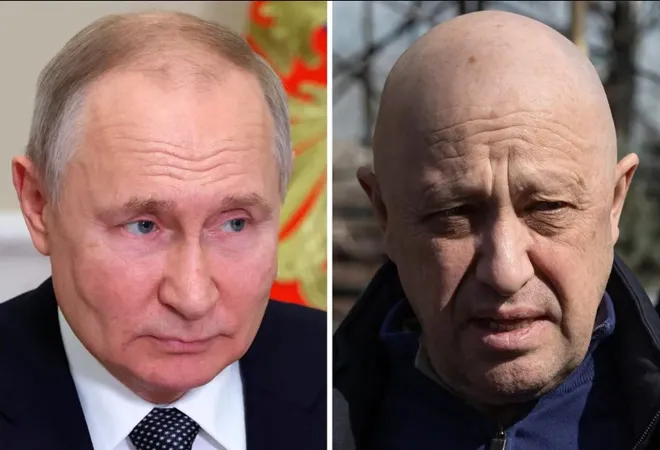-
CENTRES
Progammes & Centres
Location
The Wagner mutiny raises some uncomfortable questions about the President’s control

Many assessments in the past week on the developments in Russia seem to indicate that the Wagner mutiny has weakened President Putin and that the outcome of the rebellion is the shattering of the image of invincibility that President Putin had cultivated in the past two and a half decades. If looked at closely, the rebellion highlighted the increasingly problematic relations between the Wagner group and the Russian Ministry of Defence over the course of action in Ukraine. This chain of events between 23-24 June 2023 has raised multiple questions ranging from what led to the mutiny, reactions from within Russian leadership, and its impact on the Ukraine crisis. This article looks at five key questions that emerged from these developments in Russia.
First is what led to the tensions between the Wagner Group and the Russian military leadership: The differences between the two have been on the rise for some time over a range of issues, including the rationale of war in Ukraine as well as the lack of support for the Wagner Group soldiers from the military leadership. Twofold events preceded the ‘March for Justice’—as Yevgeny Prigozhin, leader of the Wagner Group called it—first, was the abject failure of the Russian military leadership to provide the Wagner group with arms and ammunition which resulted in massive fatalities for the group. This was further compounded by the fact that Prigozhin accused the Russian military of striking Wagner’s base in Ukraine. Second was the intended plan to bring the Wagner group under the direct control of the Russian military command.
President Putin had backed the Ministry of Defence’s order for the mercenary groups present in Ukraine to sign contracts with the ministry before 1 July 2023. This order would subsume these groups within the defence ministry’s command structures and was vehemently opposed by the Wagner Group leader. This would have meant undermining Prigozhin’s influence within the group. The tensions further escalated on 23 June 2023 when Prigozhin stated that the Defence Ministry was trying to “...deceive the public, deceive the president and tell a story that there was some crazy aggression by Ukraine, that - together with the whole Nato bloc - Ukraine was planning to attack us”—thereby vowing to go “all the way” to topple the military leadership. However, one thing that stands out in this is that Yevgeny Prigozhin never claimed to overthrow President Putin, rather the targets of his outburst were Defence Minister Sergei Shoigu and the Chief of the General Staff, Valery Gerasimov—whom he accused of failing the Wagner Group. Therefore, it appeared to be a breaking point between the Wagner group and the Defence Ministry to protect his interests in the group.
Twofold events preceded the ‘March for Justice’—as Yevgeny Prigozhin, leader of the Wagner Group called it—first, was the abject failure of the Russian military leadership to provide the Wagner group with arms and ammunition which resulted in massive fatalities for the group.
Second, is reading between the lines of President Putin’s two addresses to the citizens of Russia on 24 and 26 June 2023. In his two addresses, the Russian President oscillated between vowing to crush the armed mutiny by the Wagner Group to calling the majority of Wagner Group soldiers and commanders as patriots and loyalists. However, one needs to note that President Putin did not mention Preigozhin’s name even once. In his first address, he said that Russia was facing “treason” due to personal ambitions and interests and “all those who have consciously chosen the path of betrayal...will inevitably be punished”—calling the rebellion a “fatal mistake”. However, the tenor of his second speech is completely different. President Putin goes on to reiterate that on his direct instructions, “steps were taken to avoid spilling blood” and offered the soldiers of Wagner group two choices—first, signing the contract with the Defence Ministry or other law enforcement or security agency or returning home; and second, exile in Belarus. Re-asserting his position, he vowed to keep his promise and added that “everyone is free to decide on their own” what path to choose. The two speeches appeared to be an attempt by President Putin to reassert his power, control the narratives, and highlighted that he had been at the forefront of dealing with the situation which had all the makings of spiralling out of control.
Following from the previous point, the third key question is what deal has been brokered by Belarus. So far what is known of the deal is as follows—Yevgeny Prigozhin ordered his troops to halt their march to Moscow and to return to their base in South Russia and further agreed to move to Belarus. Following this, Dmitry Peskov, Kremlin’s spokesperson, announced that the criminal charges against Prigozhin will be dropped as he exits Russia. He further added that considering their service to Russia, no charges will be placed against the Wagner troops who were part of the march. What has not been released are the concessions that have been made to Prigozhin. The focus, for now, seems to have shifted from crushing the mutiny to avoiding the bloodshed—a reference that was present in both President Putin’s speech of 26 June 2023 and Prigozhin’s statement post the deal.
The two speeches appeared to be an attempt by President Putin to reassert his power, control the narratives, and highlighted that he had been at the forefront of dealing with the situation which had all the makings of spiralling out of control.
What is interesting is the role played by Belarusian President, Alexander Lukashenko in resolving the situation. During the course of the conflict in Ukraine, Lukashenko has emerged to be the strongest ally for President Putin, even allowing Moscow to station nuclear weapons in Belarus. This recent intervention further adds to the increasing influence of Lukashenko in Russia. While the real intentions of what the Belarusian President hoped to achieve by brokering the deal is difficult to ascertain—it could be repaying the favour for President Putin’s support to his presidency during the 2020 protests after he was accused of tampering with the elections, however, it remains to be seen what this latest deal entails for Minsk.
Fourth is what is the fate of the Wagner Group in the aftermath of the mutiny. Wagner Group has been a critical part of President Putin’s power projection abroad. They have been operating in various countries in Africa, especially in Mali, Libya, the Central African Republic, and Sudan, and have played a very important role in stabilising the Assad regime in Syria. However, their biggest successes have come in Ukraine, where they have been able to register gains in territories where Russian forces have underperformed. During their offensive in Ukraine, they have taken heavy losses, with the Wagner leader estimating the loss of over 20,000 men in the battle for Bakhmut. Following the “March for Justice”, the future of the Wagner group hangs in a delicate balance. So far, Prigozhi has given no intention of disbanding the group and had sent out the message that President Lukashenko was allowing them to remain operational in Belarus. While, according to reports, the Wagner group was still actively recruiting fighters from various Russian cities, however, the impact of the mutiny on the places it has been operating outside Ukraine remains to be seen. Also worth mentioning is their operations in Africa and West Asia, while Russian Foreign Minister, Sergei Lavrov had said that the Wagner group will not be withdrawn from the countries, very little is known about how these stationed mercenaries have reacted to the developments in Russia or how they are going to impact their larger operations outside Europe.
The Wagner group was still actively recruiting fighters from various Russian cities, however, the impact of the mutiny on the places it has been operating outside Ukraine remains to be seen.
Finally, what will be the impact of Wagner mutiny on the conflict in Ukraine? Before any assessments of the Wagner group withdrawing from the fighting in the frontlines, it needs to be noted that the troops had already started to withdraw from Bakhmut in May 2023 with Russian soldiers replacing their units. So far, there has been no noticeable impact on their actions in Ukraine, rather the intensive missile strikes across various Ukrainian cities point to the fact that the domestic upheaval will have no bearing on their offensive in Ukraine. Therefore, in the short term, there is unlikely to be a change in their approach towards the war. However, in the medium to long term, since the mutiny exposed the security vulnerabilities, as the Wagner group was able to initiate a mutiny and advance towards Moscow with ease, there may be a significant tightening of the security apparatus both domestically and internationally to potentially stem similar actions.
There is still no clear sense of what exactly happened, but what is clear is that the “March for Justice” by the Wagner group presented one of the most critical challenges to President Putin in his two-and-a-half decade of power. The same could be said of the deal that was brokered by Belarusian President, Alexander Lukashenko which led to the de-escalation of the situation and the eventual retreat of the Wagner group. The intense back and forth by Prigozhin—from his rapid advance towards Moscow to his sudden retreat—has resulted in many questioning his intentions behind the entire episode: Was it to challenge President Putin’s power? or was it to capture Sergei Shoigu and Valery Gerasimov, against whom he had grievances? or was it just a display of discontent over the impending absorption of Wagner group soldiers within the defence forces? In short, it remains a mystery as to why he did what he did and also why he did not go all the way to Moscow. While he clarified that he never intended to challenge President Putin’s power—intended or not—the sequence of events did raise some uncomfortable questions about the President’s control. The complete fallout of the Wagner mutiny is still unravelling, however, Prigozhin’s issues with Russia’s military actions in Ukraine and who is responsible for the underperformance of the Russian Army are going to resonate in the near future within Russian leadership.
Ankita Dutta is a Fellow with the Strategic Studies Programme at Observer Research Foundation.
The views expressed above belong to the author(s). ORF research and analyses now available on Telegram! Click here to access our curated content — blogs, longforms and interviews.

Ankita Dutta was a Fellow with ORFs Strategic Studies Programme. Her research interests include European affairs and politics European Union and affairs Indian foreign policy ...
Read More +